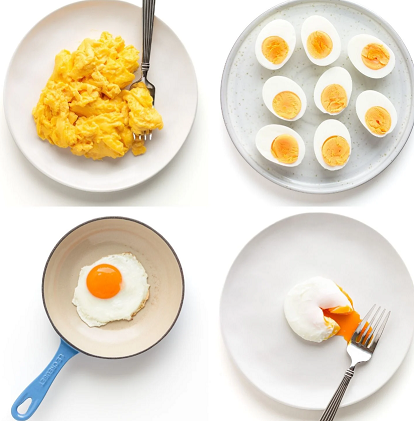In this post, we will be exploring the different ways to cook an egg, how long it takes, and the health considerations of each. The earliest evidence of boiling eggs comes from archaeological findings in China, where fossilized eggshells dating back to around 5000 B.C. have been discovered with evidence of scorching, indicating that they were likely boiled. Similarly, evidence of boiled eggs has been found in Egypt, with references to boiling eggs in ancient Egyptian texts dating back to around 1600 B.C. Since then, we’ve developed new techniques to cook eggs.

Lets explore the different ways to cook an egg:
| Egg Cooking Method | Description | Average Cooking Time |
|---|---|---|
| Fried Eggs | Eggs are cracked into a hot pan with oil or butter and cooked until the whites are set but the yolks are still runny or cooked to desired level of doneness. | Cooking time varies based on desired doneness, but typically around 2-4 minutes for sunny-side up (runny yolk) and 4-6 minutes for over-easy (slightly runny yolk). |
| Scrambled Eggs | Eggs are beaten, seasoned, and cooked in a pan with butter or oil while continuously stirring to create soft curds. | Cooking time varies based on desired consistency, but typically around 2-3 minutes for soft and creamy scrambled eggs. |
| Poached Eggs | Eggs are gently simmered in water with a splash of vinegar until the whites are set but the yolks remain runny. | Cooking time varies based on desired doneness, but typically around 3-4 minutes for a runny yolk. |
| Boiled Eggs | Eggs are submerged in boiling water and cooked to desired level of doneness, ranging from soft-boiled with runny yolks to hard-boiled with fully set yolks. | Cooking time varies based on desired level of doneness, but typically around 4-6 minutes for soft-boiled (runny yolk) and 9-12 minutes for hard-boiled (fully set yolk). |
| Baked Eggs | Eggs are cracked into a greased oven-safe dish with other ingredients such as vegetables or cheese, and baked in the oven until the whites are set and yolks are cooked to desired level. | Cooking time varies based on the dish and ingredients used, but typically around 10-15 minutes in the oven, depending on desired level of doneness. |
| Omelettes | Eggs are beaten, seasoned, and cooked in a pan with fillings such as cheese, vegetables, or meats, then folded over to create a folded and filled dish. | Cooking time varies based on desired consistency, but typically around 3-5 minutes for a soft and creamy omelette. |
| Frittatas | Eggs are beaten, seasoned, and cooked in a pan with fillings such as vegetables, cheese, or meats, and finished in the oven until the top is set. | Cooking time varies based on the size and thickness of the frittata, but typically around 15-20 minutes in the oven, until the top is set. |
| Shirred Eggs | Eggs are cracked into individual ramekins, seasoned, and baked in the oven until the whites are set but yolks remain runny. | Cooking time varies based on desired doneness, but typically around 10-15 minutes in the oven for runny yolks. |
| Microwaved Eggs | Eggs can be cooked in the microwave in various ways, such as poaching in water, scrambling in a microwave-safe dish, or making a microwave omelette. | Cooking time varies based on the method used, but typically around 1-2 minutes for microwave-poached eggs, and 1-3 minutes for microwave-scrambled eggs or omelettes. |
| Steamed Eggs | Eggs can be steamed in a steamer or using a steam rack, resulting in a delicate and custard-like texture. | Cooking time varies based on the steaming method and desired consistency, but typically around 6-10 minutes for steamed eggs with a custard-like texture. |
The healthiest way to cook an egg is to use cooking methods that do not involve adding excessive amounts of unhealthy fats or oils, and that preserve the nutrient content of the egg. Here are some healthy ways to cook eggs:
- Boiling: Boiling eggs in water is a healthy cooking method as it doesn’t require any added fats or oils. Soft-boiled or hard-boiled eggs are good options as they don’t require added fats for cooking and can be eaten without added salt or seasonings.
- Poaching: Poaching eggs involves gently simmering eggs in water without adding any fats or oils. It’s a healthy cooking method that preserves the natural nutrients of the egg while avoiding the use of added fats.
- Baking: Baking eggs in the oven, such as in a frittata or baked egg dish, can be a healthy option as it doesn’t require additional fats for cooking. You can use a variety of vegetables and lean proteins to make a nutrient-rich meal.
- Microwaving: Microwaving eggs is another healthy option as it doesn’t require any added fats for cooking. You can make microwave-scrambled eggs or microwave-poached eggs with minimal added fats and seasonings.
- Dry Frying: Dry frying, also known as a non-stick pan frying, involves cooking eggs in a non-stick pan without adding any fats or oils. The non-stick coating helps prevent sticking, and you can cook eggs with minimal added fats.
- Steaming: Steaming eggs is a healthy option as it doesn’t require any added fats, and it’s a gentle cooking method that preserves the nutrients in the eggs. You can steam eggs in a steamer basket or a microwave-safe container with a lid.
It’s worth noting that while eggs are a nutritious food source, the overall healthiness of a cooked egg dish also depends on other ingredients used in the recipe, such as added fats, seasonings, and accompaniments.
We hope with this information you’ve learned more about the different ways to cook an egg. If your looking to cook an omelette, check out our Omelette Tips or Common Mistakes When Cooking An Omelette.








